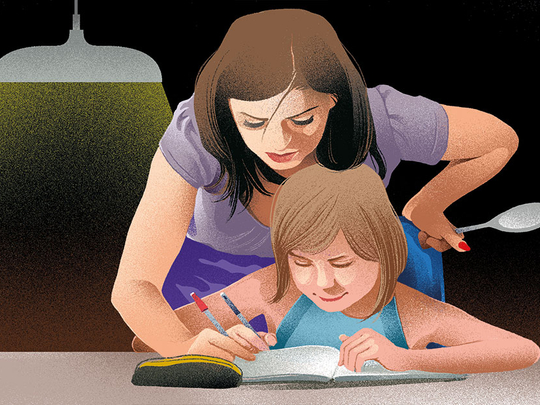
Steady pace
Raising individuals rather than clones
While high academic fees may have triggered the need for parents to consider homeschooling, I would argue that today that by itself should not be – and in the future will not be – the reason to opt for it. A prime factor to consider while choosing homeschooling as an option is to understand this teaching style’s inherent ability to kindle the innate and unique qualities and skills of the child, rather than foster a run-of-the-mill kind of development.
However, this run-of-the-mill development is something a traditional style school system inevitably tries to achieve, as their business model generates optimal profits only when a critical threshold is achieved in the activities of the developmental process. It is a well established fact that individuals graduating from a specific field of study produce similar kinds of products, processes or services. Whereas individuals graduating from different educational backgrounds or schools of thought produce entirely different outcomes at their workplace. So, one can imagine the rich and entirely unique contribution of individuals coming from a homeschooling background. Additionally, I think homeschooling offers the child some freedom of horizontal or vertical movement in learning in a broad field, which perhaps needs to be anchored around the scope of the curriculum prescribed. Freedom also extends to the pace of learning and, indeed, the freedom to redraw the learning curve that surrounds certain subjects.
When it comes to social aspects of a child’s development, there are some negatives to homeschooling. Social skills might be hampered and to fix that one must work around it, like making the child join organisations outside of academics that they participate in regularly.
From Mr Lewis Fernandes
Academic Counsellor based in Sharjah
Personalised
Children get authentic, real-life experiences
As a parent and promoter of homeschooling, conforming to the “norms” of mainstream schools never sat comfortably in my heart.
Three main reasons why I believe homeschooling is the way forward are flexibility in learning, developing academic, emotional, religious and social skills through authentic real-life experiences and personalised learning.
Schools are rigid in schedules. Flexibility in homeschooling allows those children, who find some concepts hard, time to work through and master their work before moving on.
In schools, if a child is ready to go to the next level, he or she is often held back until a sufficient number of children are at the same place before moving forward. This creates frustration and boredom. In homeschooling, children move at their own pace.
The educational development of our children is just as important as their emotional, social and religious development. Experiencing life outside of the classroom often leads to better absorption of knowledge. Since they can see what is taught and not just hear about it. The social pressures including bullying, peer pressure and this notion to ‘fit in’ or achieve a perceived level of social status among classmates can be quite great. Homeschooled children have the flexibility of striving through their own interests and activities and can do so at a higher level than they could in school. Justifying the high level of fees in schools, against the student-teacher ratio of upwards of 25:1, should be a concern to all parents, especially in ‘private’ institutions.
A major misconception amongst those who are unfamiliar with homeschooling is the lack of socialisation. Homeschooled students actually receive a more diverse form of socialisation than any school-going student simply because they attend and participate in gatherings and activities with students and adults of all ages and not just those who are their own age. This too will be the reality of the working world that they will soon enter, hence giving them better preparation than those who study in schools with students of the same age throughout the day.
Homeschooling as a parent can be extremely challenging although it is without doubt a highly rewarding endeavour. Nevertheless, taking responsibility for all the subjects your child is required to learn or has an interest in is no mean feat. This is where some education bodies can provide invaluable support.
From Mr Abu Sufyaan Patel
CEO and director of a learning centre in Dubai
Reality
A home school helped me perform better
Can a single parent substitute a team of teachers? I think this point is definitely relevant at a high-school level, because the material that you need to learn is quite advanced, so you need a specialist teacher. But I personally think that at any level below Grade 9 or 10, it would be suitable for a parent to teach. Anyway, most of the homeschoolers I know who are my age have qualified tutors to teach them particular subjects. In my case, my mum has a university degree in microbiology, so she had no trouble teaching me science or biology. In fact, when I started Year 8/Grade 7 at a school in September last year after four years of homeschooling, I was put into the higher class or top set of all core subjects - maths, english, science and arabic.
I also definitely disagree with the point that homeschooling leads to poor social skills. When I homeschooled, I had many chances to meet with children my age from coding class to football squad to playing with my neighbours. Since I started school, I have had no difficulty making friends. Apart from these classes, I have also taken part in many other ‘non-academic’ activities such as swimming, taekwondo, tennis, and TedEd public speaking. If anything, I had more extracurricular activities than I would have had in a school. The only down side is that we had to travel a lot by car to get to all of these places.
Also, I personally do not know of any children my age who homeschool and have anxiety issues other than people who were shy to talk in front of an audience in public speaking class. But I think that if somebody did have such issues, homeschooling would be a great option because students get to learn at their own pace with people who they are familiar with (friends and family) and decide when and how often they choose to interact with other children.
From Mr Shareef Sayeed
Pupil based in Dubai
Myths
It is not necessary that homeschooling has an adverse affect on development of social skills
I think that for an individual, it is difficult to achieve the experience and training of a group of teachers. Additionally, I think that it is very important for students to be surrounded by other adults that represent leaders, provide guidance and are authority figures, besides their parents. This helps children accept and respect the roles and rules that they would have to deal with throughout their life at university and work. However, ‘homeschooling leads to poor social skills’ is a very common assumption that in my opinion is not completely true. Children develop their emotional and social skills; becoming individuals who are socially aware of themselves and others; first at home through family dynamics and then at school and in other environments. In my opinion, a child who is homeschooled inevitably misses many situations that are opportunities of learning – moments of interaction with other individuals, discussions, debates and more that a parent on their own cannot recreate at home. But at the same time, I also believe that a family can offer to children other opportunities for this through extracurricular activities and also through positive family discussions. So, saying that homeschooling means poor social skills is limiting.
In the case of children with anxiety, they feel more secure and at ease when they are at home with close family members. Children are so often targets of bullying and peer pressure that is often the cause of social anxiety. These dysfunctional situations can be almost unbearable for such individuals. However, I think that homeschooling is not the solution for social anxiety. A home setting surely reduces the amount of anxiety for these individuals in the moment but it does not treat or help with the cause in the long term. In other words, I firmly believe that in order to overcome anxiety, children have to be exposed to the social settings that increase their anxiety but they should be assisted during this exposure with supervision, education and social encouragement. Only in this way can their social anxiety really be treated. If we keep children away from the triggers of their anxiety, we indirectly increase their fear since they feel so secure at home that they might not feel comfortable in any other social setting. It’s important to learn these coping skills, as growing up they will face more social environments that could be triggers of anxiety. Nevertheless, I know that in certain situations it is necessary to intervene with homeschooling, but those are rare and extreme.
When it comes to extracurricular activities that schools provide, if parents are well-organised in their time they can provide children with many extracurricular activities. But it might be challenging to get the same variety of activities that good schools offer.
In conclusion, I think that homeschooling can be a choice in situations where going to school for children is not a possible option as it might be extremely challenging on an emotional, social or practical level. But it must be kept in mind that homeschooling is not as easy at it seems.
From Dr Valeria Risoli
Clinical psychologist based in Dubai
— Compiled by Falah Gulzar/Trainee Social Media Journalist and Huda Tabrez/Community Web Editor
Gulf News asked: Which school would you prefer for your child?
• Home school 13%
• Traditional school 70%
• Boarding school 17%
Have Your Say: Are high tuition fees pushing parents towards homeschooling? Do you think a homeschool can successfully replace traditional schools? Is it a good option for children who suffer from anxiety in social settings? Share your views with us or participate in future debates. Write to us at readers@gulfnews.com













